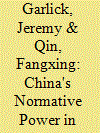| Srl | Item |
| 1 |
ID:
190481


|
|
|
|
|
| Summary/Abstract |
Normative power China (NPC) has characteristics distinct from Manners’ conception of normative power Europe (NPE). While NPE attempts to establish rules for interaction, NPC introduces practices to be co-constituted via regional platforms through a process of ‘earned recognition’. In Central and Eastern Europe (CEE), NPC’s regionalising ‘group cooperation diplomacy’ has taken the form of the ‘16/17 + 1’ cooperation framework. Using normative power theory, the article assesses, via a critical discourse analysis of speeches and interviews, how and why China’s attempts to shape practices, earn recognition and create a community of practice in CEE have met with—at best—only limited success.
|
|
|
|
|
|
|
|
|
|
|
|
|
|
|
|
| 2 |
ID:
190480


|
|
|
|
|
| Summary/Abstract |
This article analyses the content and structure of the Kremlin’s political discourse since the start of Vladimir Putin’s presidency in 2000 and in the context of the conflicts in Georgia and Ukraine (annexation of Crimea and the conflict in Donbas). We apply structural topic modelling (STM) and focus on the official English-language Kremlin transcripts, a total of more than 8,000 texts. Our findings demonstrate that these conflicts became important markers to reveal a gradual shift in the period 2000–2019 away from the prevalence of foreign policy topics to the dominance of domestic issues and Russia’s change of emphasis to bilateral relations with non-Western countries.
|
|
|
|
|
|
|
|
|
|
|
|
|
|
|
|
| 3 |
ID:
190479


|
|
|
|
|
| Summary/Abstract |
This article aims to analyse the impact of the COVID-19 pandemic upon electoral campaigns in a fragile democracy (Georgia) and two illiberal polities (Belarus and Russia). It covers the period of time from March to December 2020, focusing on several critical junctures in each country: for Belarus, the 9 August 2020 presidential elections; for Russia, the 1 July ‘people's vote’ and the cycle of regional elections in September 2020; and for Georgia, the 31 October 2020 parliamentary elections. The article argues that COVID-19 did not diminish citizens’ demands for fundamental norms of electoral democracy and policy transparency; in fact, it increased political mobilisation within all three countries.
|
|
|
|
|
|
|
|
|
|
|
|
|
|
|
|
| 4 |
ID:
190482


|
|
|
|
|
| Summary/Abstract |
This article engages with discourses of freedom and liberation through neoliberalisation developed by Estonian elites during that country’s transition from Soviet domination. Building on debates about the importance of neoliberalisation as an analytic concept and about its origins, content and trajectory, the article argues that Estonians were attracted to neoliberal utopias of ‘freedom’ and ‘self-reliance’, which they saw as improvements to the life they had experienced under Soviet domination. The article argues that discourses of ‘freedom’ and the right to be a self-directed individual have acted as mobilising utopias since 1989.
|
|
|
|
|
|
|
|
|
|
|
|
|
|
|
|
| 5 |
ID:
190484


|
|
|
|
|
| Summary/Abstract |
What role do political opportunities play in far-right mobilisation? The case of Georgia indicates that modernisation in itself may be insufficient to trigger a far-right backlash. A systematised database of 154 far-right protest events in Georgia in the period 2003–2020 shows that the movement remained dormant for over two decades after post-Soviet independence and a decade after the 2003 Rose Revolution. After 2012, however, less severe repression of protest, divides within the political elite, and the sympathetic attitudes of mainstream political and societal actors enabled far-right mobilisation and violence. Thus, however deep-rooted anti-modernisation, a backlash may not erupt until mobilisation opportunities become available.
|
|
|
|
|
|
|
|
|
|
|
|
|
|
|
|
| 6 |
ID:
190485


|
|
|
|
|
| Summary/Abstract |
This article provides an in-depth analysis of the system of production of expertise on Polish–Russian relations in post-1989 Poland. For this purpose, the author develops the concept of the ‘space of opinion’ on Polish–Russian relations, focusing on the reconstruction of its origins and main structures. The present analysis challenges the idea of a radical rupture in the theoretical and ideological background of Poland’s Eastern policy after 1989—promoted by dominant interpretations in the literature—and highlights historical continuity in a long-term perspective.
|
|
|
|
|
|
|
|
|
|
|
|
|
|
|
|
| 7 |
ID:
190483


|
|
|
|
|
| Summary/Abstract |
This article investigates informal networks of entrepreneurs in Southeast Europe. Informal networks are defined as based on trust relationships and used for seeking competitive advantage in business. We assess the costs of informal networks, including their non-monetary and monetary components, on the basis of in-depth interviews with entrepreneurs in small and medium-sized business in the region. The evidence points to an ambivalence towards informal networks, perceived to be both affective and instrumental, and the prevalence of double standards. Informal networks are welcome when they help but resented when they help others, thus reproducing the pressure of maintaining informal networks.
|
|
|
|
|
|
|
|
|
|
|
|
|
|
|
|